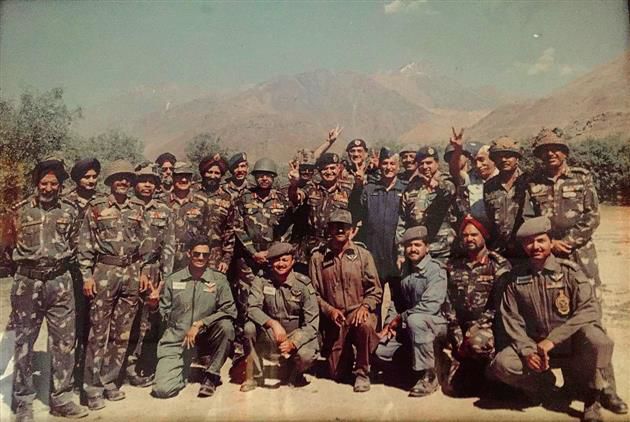
Celebrations: India’s victory in the Battle of Tololing, in which 8 Mountain Division played a key role, was a pivotal moment of the Kargil War. File photo
Lt Gen Mohinder Puri (retd)
Former Deputy Chief of Army Staff
A quarter century has passed since Pakistan’s attempt to intrude across the Line of Control (LoC) to avenge its successive defeats at the hands of the Indian armed forces. The war in Kargil, fought in May-July 1999, was another effort by Pakistan to regain its honour after its humiliating defeat in 1971, which led to the dismemberment of that country, and was followed in 1984 by our occupation of the Siachen Glacier. In the late 1990s, Pakistan’s strategy of inflicting ‘a thousand cuts’ on India was not producing the desired results. The situation in the Kashmir valley had stabilised. The Army had brought insurgency under reasonable control for the Central Government to hold elections in Jammu and Kashmir in 1996 and instal an elected government. In this backdrop, Pakistan launched its operations by intruding into the Mushkoh-Drass-Kargil-Batalik sectors, over a frontage of approximately 130 km, in areas where both sides traditionally used to vacate their posts during the winter months and reoccupy them once the snow melted. While Pakistan’s political aim was to bring back the Kashmir issue on the world stage, its military aim was to isolate Ladakh and secure maximum territory with a view to changing the alignment of the LoC.
As the local unit sent out patrols, it became evident that several places had been intruded into by the enemy. It was also apparent that undetected intrusions were an intelligence failure.
I had the honour and privilege of commanding the 8 Mountain Division in the Valley and on the outbreak of hostilities in the Drass-Mushkoh sector. In early May, the battalion in Batalik received information from a local grazier of suspicious movement in the sector, which perhaps was not given the attention it deserved. As the local formation sent out patrols, it gradually became evident that a number of places had been intruded into by the enemy; yet, there was no clarity on the identity of the intruders and it was apparent that the undetected intrusions were an intelligence failure. However, the ferocity and speed with which the Army responded surprised Pakistan and disrupted its plans of consolidating the initial gains.
I was ordered to assume operational responsibility of the Drass-Mushkoh sector on June 1 and immediately set into motion preparations for our first attack. As the battalions got inducted from the Valley, they were given time to reorient their battle drills and procedures from counter-insurgency operations to conventional warfare, carry out advanced stages of acclimatisation and a recce of their nominated objectives. Meanwhile, the artillery, both integral and reinforced, was getting inducted and preparations for their gun positions and dumping of ammunition were in full swing. Having considered our pace of buildup and level of preparation, I decided to launch the first attack on Tololing on the night of June 12/13 with 2 Rajputana Rifles, with two companies of 18 Grenadiers providing the firm base, while the balance of the battalion was employed as reserve.
As one crosses Zoji La, one is awestruck by the terrain which tactically favours the defender and puts the attacker at serious disadvantage. The conduct of military operations demands proper acclimatisation, clothing to survive in the extreme cold climates and high levels of physical fitness. For a well-planned attack, the approaches are narrow, restricted and arduous, the going is uphill and the attacking troops, as a consequence, are likely to suffer heavy casualties. The momentum of the attack is slow and the high altitude and rarefied atmosphere add to the toll on troops and equipment. The limitation of movement along only one available major road axis also creates several tactical and logistic problems. The induction of troops as reinforcements or reserves, the availability of limited areas for the deployment of guns and their movement, and constraints on logistics are some of the major issues which need to be factored in while evolving any operational plan.
As scheduled, 2 Rajputana Rifles commenced its attack at 8:30 pm with massive artillery support, and since this was the first coordinated attack by the division, the atmosphere was extremely tense. The attack progressed satisfactorily, and by the first light, we had the better part of Tololing in control, except the top, which was holding out. The commanding officer, Col MB Ravindranath, an intrepid leader, saw a weakness in the enemy’s defences, and in a daylight assault, cleared the remnants, to our immense joy. With our victory at Tololing, the battle of the ridges commenced as we successfully went ‘ridge-hopping’ to restore the sanctity of the LoC and the honour and pride of the Army as well as the country. Every battalion was launched with the effective support of the artillery and combat engineers, fully backed by communications and logistics. All, without exception, met with success in accomplishing their task.
The Kargil War was a saga of bravery, raw courage, discipline and sacrifice by young officers and men, many of whom laid down their lives so that we could live a life of honour and dignity. While the courage displayed by Capt Vikram Batra and Capt Manoj Pandey, along with now Grenadier (later Honorary Captain) Yogendra Singh Yadav and Rifleman (later Subedar Major) Sanjay Kumar, all recipients of the Param Vir Chakra, is part of folklore, there are numerous untold stories of the courage and determination displayed by young officers and men in bringing victory to the country.
We had a heavy toll of casualties, losing 559 men in the operations. On the 25th anniversary of the war, it is to these bravehearts that we pay homage and remember their sacrifice for the country. We also need to recognise the sacrifices made by the Veer Naris, many of whom were widowed days after their marriage, in having lived a life of dignity and brought up their children as worthy citizens of the country.
The author commanded 8 Mountain Division during the Kargil War
Join Whatsapp Channel of The Tribune for latest updates.
#Indian Air Force #Indian Army #Indian Defence #Indian Navy #Kargil #Pakistan



























